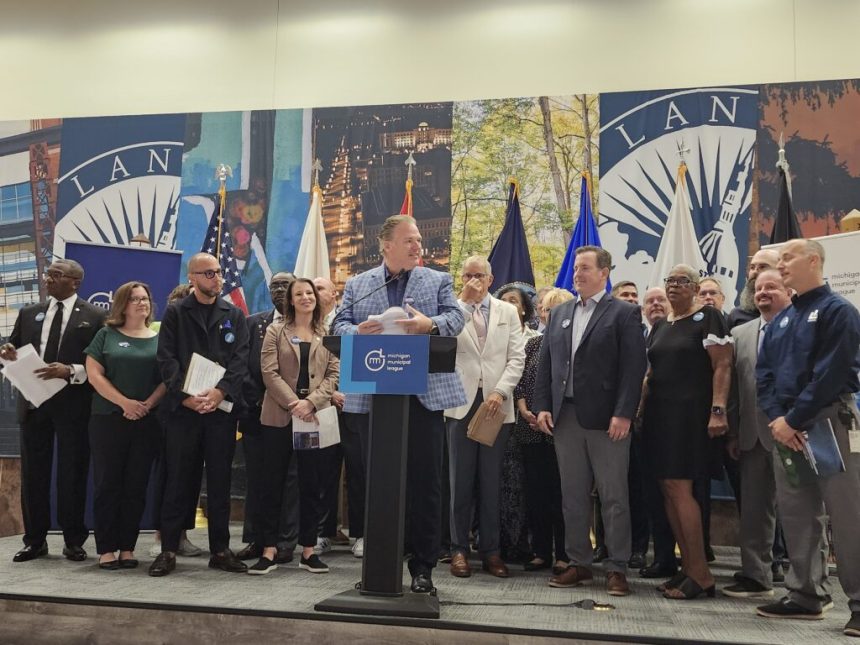Dan Gilmartin, CEO and executive director of the Michigan Municipal League, speaks at a news conference announcing the MI Home Program, which would ask the Michigan Legislature to provide $160 million in various grants and new funds in partnership with local leaders and home builders to address Michigan’s housing crisis. Aug. 19, 2025 | Photo by Ben Solis/Michigan Advance
A new approach to solving Michigan’s housing crisis was pitched on Tuesday, with a $160 million legislative funding request that supporters said would be a bold new strategy for new and rehabilitated attainable dwellings.
Dubbed the MI Home Program, the plan would leverage partnerships with local governments, developers and the Michigan Legislature with fewer barriers to boost housing construction and rehabilitation, supporters said at a news conference hosted Tuesday by the Michigan Municipal League. The goal was to also revamp local zoning rules to help accelerate new home builds across the state.
The $160 million investment pitched at the news conference – which would need legislative approval and is not yet a part of the state’s upcoming budget, which remains in limbo – would span five years and could lead to the development of 10,000 housing units within reach for Michigan residents.
Dan Gilmartin, CEO and executive director of the Michigan Municipal League, said the proposal addresses the need for attainable housing, which has grown to a topic of discussion all across the state.
SUBSCRIBE: GET THE MORNING HEADLINES DELIVERED TO YOUR INBOX
“Here in Michigan, we’ve identified the need to put forward a statewide housing plan, made significant investments and changed policy to help each of these has been successful,” Gilmartin said. “But we must continue to work together if more progress is to be made.”
Gilmartin said the proposal includes four targeted programs that would fund updates to zoning regulations, provide grants to fill finance gaps on a short-term basis, create a revolving loan fund to address long term gaps, and ongoing funding for the employer assisted housing fund.
Eligible properties would include single use unit houses, duplexes, triplexes, quadplexes, town homes, row houses, condos in a complex, condos in a community, dwelling units in a mixed use structure and modular homes, Gilmartin said.
Under the plan, properties that would be awarded grants would be sold or rented to individuals who have an annual income of not more than 120% of an area’s median income.
“It also ensures the property stays attainable for no less than 10 years,” Gilmartin added.
The readiness incentive grants would need an investment of $5 million, while base level home grants would need an investment of $95 million in the first two years of the plan, increasing to a $145 million investment in years three through five. Those latter grants would fill the gap when building or rehabbing homes.
The revolving home fund would need a $50 million investment in the first two years that can be layered with grant dollars to address other gaps.
The employer-assisted housing fund would need $10 million annually to continue operation, all with the aim of matching employer investments toward workers securing housing.
Aside from Gilmartin and other members of the Michigan Municipal League, the news conference also featured state representatives including Republican Mark Tisdel of Rochester and Democrats Samatha Steckloff of Farmington Hills and Amos O’Neal of Saginaw, respectively.
“This is a housing development strategy that chooses partnership over preemption,” Steckloff said. “It’s about empowering local decision makers to meet the unique housing needs of their communities and ensuring they have the resources and flexibility to get the job done.”
Brian Farkas, director of workforce housing with Allen Edwin Homes, said the plan was about building more homes and building them the right way, in partnership with communities.
“By aligning resources, incentives, and local leadership, we can continue to work to address today’s housing needs and set the stage for long-term economic vitality across the state.”
When asked if Democrats and Republicans in the Michigan Legislature, who have shown a clear unwillingness to get a budget down quickly in a new era of divided government, could guarantee that the funding proposal would pass in a fractured environment, Gilmartin said nothing is guaranteed in Lansing.
Tisdel added that the money would only be awarded after communities have engaged in the type of zoning and code ordinance overhauls that the proposal calls for.
“The governor has rightly told us several times how many hundreds of millions or even billions of dollars we’ve spent over the last several years in generating more housing,” Tisdel said. “This is a relatively small portion of that. It’s not up front money. This is money after results.”









